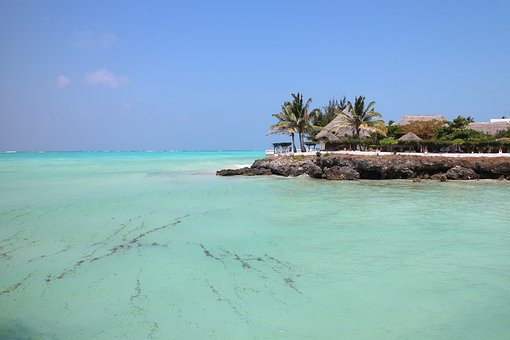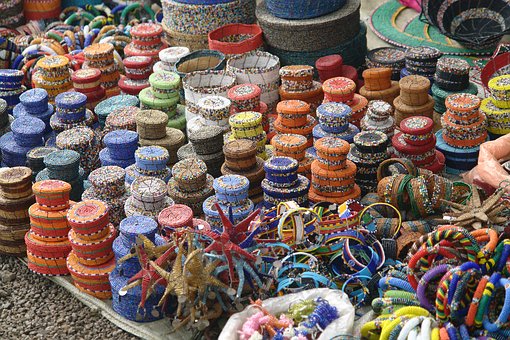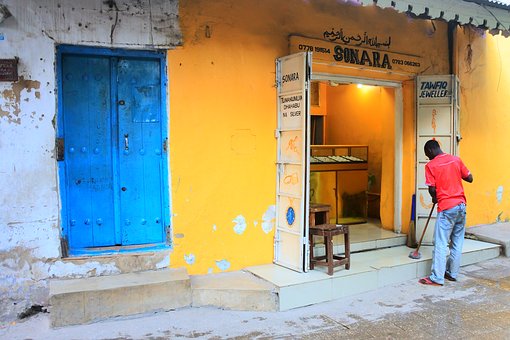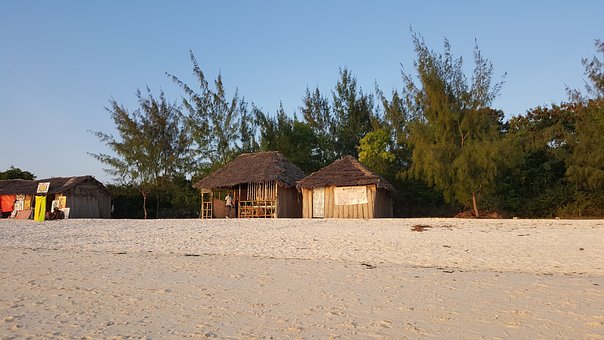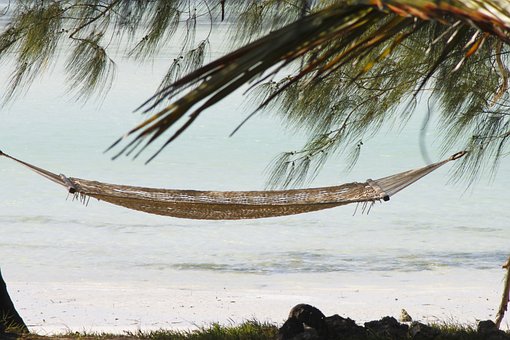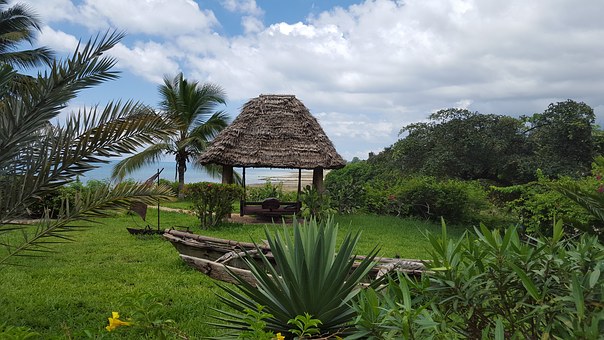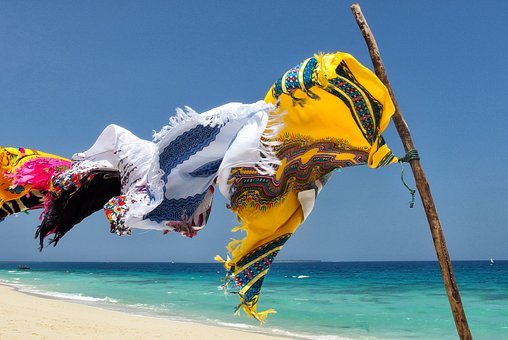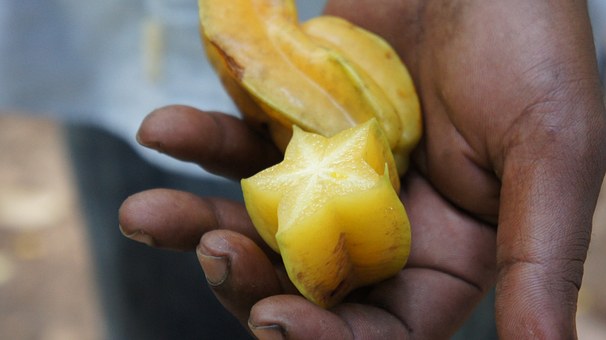Backpacking in Zanzibar
There are places in this world whose name evokes dreams of paradisiacal beaches, blue sea and exotic spices. One such place is the East African region of Zanzibar, where exoticism and adventure await you. Your journey will take you to a natural paradise that will make any backpacker’s heart beat faster. The islands Unguja and Pemba and other islands together make Zanzibar.
Zanzibar is a semi-autonomous part of the Union state of Tanzania. About 1.2 million people live on the area of 2,461 km² on Unguja. Pemba Island has an area of 984 km². 407,000 people live here. During backpacking in Zanzibar, unique coral reefs await you in front of the islands. In the coastal area seagrass meadows can be found.
Zanzibar City is not only the largest city of Unguja, but also the capital and seat of government of Zanzibar. Around 208,000 people live here. Unlike many other paradisiacal destinations, Zanzibar lacks a perfectly developed infrastructure. But the nice thing about it is that you have the chance to find wonderful spots that are just waiting to be discovered by you.
Zanzibar also has other islands that you can visit while backpacking in Zanzibar. The third largest is Mafia, which is located in the south. Opposite Stone Town is Chapwani Private Island. You can get there by boat in 15 minutes. It is a jewel in the Indian Ocean and offers you an indescribable underwater world and picturesque fishing villages.
Another island is Chumbe Island, which is classified as a nature reserve. A boat trip takes about 30 minutes. You can also experience a beautiful spot on Bawe Tropical Island. After a 30 minute boat trip from Stone Town you will reach this island. It is the ideal place if you are looking for a quiet exceptional stay.
The unique landscape with white sandy beaches, palm trees and blue sea has an extraordinary cultural and social combination. You’ll soon feel that the clocks on the island are ticking quite differently. Stone Town, the old town of Zanzibar City is a UNESCO World Heritage Site. During a ramble through the capital it quickly happens that you get lost in the narrow lanes. To the right and to the left, there are shops lined up in which one can buy spices, African handicrafts and colourful cloths (kikoys for men, kangas for women).
Inevitably you arrive at the Darajani market, where fruit, vegetables, fresh meat and fish are sold. At first, you’ll be shocked by the sight and smell that takes getting used to. In Stone Town there are exciting sights like the House of Wonder. This sultan’s palace was built at the end of the 19th century and was the first building with running water and electricity.
You should approach the subject of safety with common sense and pay attention to a few No-Gos. This includes walks in the dark, when there are no hotels or villages in the immediate vicinity. Illuminated areas are not a problem. If there are elections, you should avoid Stone Town, as there are always demonstrations and attacks. And that you should not leave valuables and luggage unattended is actually a matter of course.
You can get money at the ATMs. But there are not many of them in Zanzibar. ATMs are only available in the capital on the western side of the island, in bigger cities and expensive hotels. Therefore you should buy enough cash for your backpacker trip. Your credit card won’t get you anywhere, because many accommodations don’t accept credit cards.
In Zanzibar the official and common language is Swahili and English. But there are also areas where Arabic is spoken. You don’t have to starve on your backpacker trip either, because there are African delicacies on every street corner.
Culture in Zanzibar
The culture in Zanzibar is Muslim influenced. The Sufi orders are very widespread. The Qadiriya is most popular in cities and rural areas. There are other Muslim faiths that you will encounter during backpacking. In Zanzibar you experience an indescribable friendliness. People smile a lot. On the streets travellers are greeted with a friendly “Jambo” (hello to Swahili) or “Karibu” (welcome). Zanzibar is known for the fact that on the island different religions live peacefully together.
However, in recent years there have been attacks on Christian dignitaries and institutions, which have raised the fear that the friendliness towards tourists and people of other faiths could change. The reason for this assumption is a radical group of Islamists. They are demanding secession from the mainland. The culture in Zanzibar includes acting. You can get a better price everywhere, especially at markets or street stalls.
More Backpacking information about Zanzibar
Zanzibar, the semi-autonomous state of Tanzania is one of the most expensive countries in Africa. You need between 50 and 70 Euros per day to cover your costs as a backpacker. It is indeed cheaper. But then you have to do without some exciting experiences.
You can simply travel to Zanzibar or immerse yourself in the culture of the country. The city and country life is very different, caused by the infrastructure. In the meantime, progress has also found its way into cities, but does not even come close to European standards. In rural areas you can make an exciting journey back in time to a long forgotten time.
There are a lot of overnight accommodations in Zanzibar. There are also real bargains to be found, where you pay 6-10 euros. The average price for a simple hostel or a hostel is between 12 and 30 euros. Zanzibar is famous for delicious dishes of African cuisine. You will get great curries as well as grilled calamari or fresh tuna and many other tasty dishes that you should definitely try.
As a German citizen you need a visa to enter Zanzibar. You can apply for it before your trip or have it issued at the airport. What else you should know as a backpacker in Zanzibar, you can find under Visa & Vaccinations.
Backpacker Budget in Sansibar
Traveling and living in Zanzibar is quite expensive compared to other backpacker countries. As a rule, you can assume that you will need between 50 and 70 Euros per day to make ends meet. The local currency is the Tanzania Shilling (TZs). But also US dollars can be quite helpful when paying.
For a warm meal in Zanzibar you should plan at least 4.50 Euro, better even 6 or 7 Euro. The relatively high prices for a meal are based on the fact that the bars, restaurants and snacks are reserved exclusively for tourists. Most locals eat at home. By these prices the authentic feeling is strongly diminished. It becomes cheaper in the villages like Nungwi or Paje. But don’t forget to act.
The local beer you get for about 2 euros (half a litre), export beers are on average 2.50 euros. For a coffee you pay between 1 and 2 euros, depending on where you buy it. For a 0.33 l Coke you pay about 1 Euro. You can get water in the supermarket for a much cheaper price. So you pay for 1.5 liters just about 0.50 euros. Who stands on McDonalds, pays for a Combo in Sansibar 6 euro.
Taxi driving Bus driving in Zanzibar
Travelling with public buses is very cheap. Therefore it is worthwhile to change to the so-called Dala Dalas. Taxi driving is indeed cheaper than in Germany, but nevertheless reduces the travel budget considerably. For a trip from Stone Town to Nungwi you have to expect about 50 Euro. With Suntransfers you can book the transfer from the airport to the desired destination in advance and calculate the costs. Taxis are very easy to find on the spot, no matter if you are looking for one at the airport or elsewhere on the island. On average you pay about 0,30 Euro for one kilometre driven.
Bus drive in Zanzibar
Local buses, called Dala Dalas, are the most common means of transport on the island. For example, if you want to get from Zanzibar City to Nungwi, you can take the 116 bus every 10 minutes until 18:00 at the Darajani Market in Stone Town. The journey takes about 1.5 hours. In the buses you will always meet friendly locals. You might even end up with a child sitting on your knees. For a trip from Zanzibar city to Kendwa, for example, you pay a maximum of 2.50 euros.
Domestic fares in Zanzibar
Domestic flights are interesting if you want to make a detour to Pemba or Tanzania during your backpacker trip. However, you can also use speedboats, which will take you to Tanzania or Pemba. Besides information about flight and ship connections you can also book the desired connection via colorsofzanzibar.
Train travel in Zanzibar
Rail travel is not possible in Zanzibar because there are no functioning train connections. There is a rail network, but there is a lack of locomotives and wagons. In addition, traffic has shifted completely to the roads. A train journey would not be profitable in terms of price either, because buses charge a minimum price for longer distances.
Backpacker Routen in Sansibar
When travelling on Unguja in Zanzibar you will come into contact with an indescribable landscape as a backpacker. Exotic palm beaches and the azure blue Indian Ocean await you. About 40 kilometres off the coast of Tanzania lies the spice island Zanzibar, which is the dream destination for nature lovers, romantics and divers. The two main islands Unguja and Pamba as well as the secondary islands, which together form Zanzibar, present themselves with a diverse flora and fauna.
The East African island is particularly famous for its abundant pepper deposits. Besides pepper, clove, cardamom, vanilla, cinnamon, ginger and nutmeg thrive here. The many spices result in a unique fragrance composition. It surrounds the island in a magical way. Apart from the large spice plantations, there is very little tropical rainforest left. The remaining virgin forests are the Kichwele Forest and the Jozani Forest, both of which are under conservation.
Large mammals search in vain in Zanzibar. Instead you will encounter smaller antelope species, cats and monkeys such as diadem monkeys and night monkeys. The warm Indian Ocean is populated by over 2,000 species of fish. On the beaches you will meet crabs and families of turtles. Wherever you go and stand, each place has its own history to immerse yourself in. What should you have seen on your backpacking trip?
Route 1: The classic (15-20 days)
- 4 days exploring Zanzibar city and discovering Stone Town. Pure shopping is the order of the day.
- 3 days exploring Kizimkazi and enjoying the beach.
- 2 days exploring the Muyuni Forest and immersing yourself in the flora and fauna.
- 2 days visiting Paje, enjoying secluded beaches and immersing yourself in the culture.
- 2 day Michamvi Kae. Experience deep green mangrove forests, sandy beaches and unique sunsets.
- 2 days exploring the Jozani-Forest nature reserve on a safari.
- 2 days in Matemwe you will encounter the originality of the country.
- 3 days in Nungwi and discover the Kichwele Forest.
Route 2: Backpacker Intensive Trip (up to 30 days and more)
- 4 days exploring Zanzibar city and discovering Stone Town. Pure shopping is the order of the day.
- 1 day Chumbe Island, coral reefs with 200 hard coral species Discover diving.
- 1 day exploring Changuu (Prison Island).
- 3 days exploring Kizimkazi and enjoying the beach.
- 2 days exploring Muyuni Forest and immersing yourself in the flora and fauna.
- 4 days to visit Paje, enjoy secluded beaches, kitesurfing and immerse yourself in the culture.
- 2 day Michamvi Kae. Experience deep green mangrove forests, sandy beaches and unique sunsets.
- 3 days exploring Jozani and the Jozani-Forest nature reserve on a safari.
- 3 days in Matemwe encountering the originality of the country and visiting the turtle sanctuary.
- 2 days exploring Nungwi and immersing yourself in its culture.
- 1 day snorkelling and diving in the Mnemba Atoll and visiting the fish market.
- 4 days to explore the Kichwele Forest.
Travel times in Zanzibar
Just like the whole coastal strip of East Africa, the weather in Zanzibar is influenced by the change between northeast monsoon and southwest monsoon. The wind from the northeast, known as the Kaskazi, brings warm, humid air from November and ensures a weak rainy season in November and December. The southwest wind Kuzi brings a stronger rainy season with it. The rainy season lasts from mid-March to the end of May.
During the day the temperatures are at 30° Celsius or higher. Due to the precipitation there is a very high humidity. In the dry season from June to October the temperatures are 25° Celsius or higher. At night the air cools down a little. The best travel time for Zanzibar is the small dry season in January, February and the big dry season from June to October. In the other months you can be surprised by heavy rainfalls on your backpacker trip.
Backpacker Unterkünfte in Sansibar
Even if Zanzibar is not very touristically developed, it does not belong to the cheap travel countries, which is also noticeable with the overnight accomodation offers. There are a lot of different overnight accommodations that you can use on your backpacker trip. However, the price differences are considerable. Cheap accommodation is available in simple hostels.
However, if you would like to stay a little more luxuriously, you can choose hotels. You will get a very pleasant standard from 3 stars upwards. For an overnight stay in a 3-star hotel you pay around 65 euros and in a 4-star hotel around 130 euros. It will be really expensive if you want to take a room in a 5-star hotel. The overnight stay can easily cost you 200 Euro and more.
But there are also hostels where you can get an overnight stay for a reasonable price. A look at the hostel page Hostelword gives you a quick overview. Overnight stays are offered in dormitories as well as in private rooms. Accordingly, you pay the following prices for a bed in a hostel:
- Zanzibar-City 9-50 Euro
- Paje 20 Euro
- Nungwi 15-21 Euro
- Michamvi Kea 30 Euro
- Kiwengwa 15-33 Euro
The prices in the hostels partly vary considerably, even within the hostel. For a double room you can easily double the price and more. Motels and hotels are sometimes a cheaper alternative, if you look closely.
Hotels and Motels on Exits and Motorways
Hotels and motels are an alternative if you are looking for an overnight option in Zanzibar City. The many resorts on your Backbacker tour certainly exceed the price range, because in the best case you pay around 50 Euro for one overnight stay. But there are also real bargains where you pay between 15 and 35 euros per person for an overnight stay with breakfast.
Campsites and guesthouses from Zanzibar
Off the beaten track of larger towns in beautiful countryside, close to the sea, there are campsites and guesthouses. These campsites do not have in common with the campsites you know from Germany. Here you will find small bungalows or cabins with rather spartan equipment. The fantastic view of the Indian Ocean and a fabulous sunset is included in the reasonable prices between 20 and 40 Euros.
Backpacker Trips & Tipps in Sansibar
I can travel to Zanzibar or completely immerse myself in the culture, lifestyle and beauty of nature and let my soul dangle. White sand as fine as powdered sugar, palm trees with coconuts gently swaying in the wind and the turquoise blue, bathtub warm waters of the Indian Ocean give you the feeling of being in paradise. Many parts of the beach are not yet developed by tourism, so you won’t meet a soul.
In Zanzibar City you’ll find charming oriental alleys and magnificent palaces that will enchant you. Zanzibar was the hub for ivory, spices and the slave trade during its weddings. Time has a different meaning on the island. Everything goes slower and with much more serenity. You will also be treated with great kindness. Get involved and experience the uniqueness of the culture.
Backpacker Highlights in Zanzibar
One of the backpacker highlights in Zanzibar is shopping. On the markets and in shops you can get unique African carvings as well as colourful fabrics and beautiful African jewellery. At the spice stands you can’t get enough of the colourfulness and the scents. In the heart of Zanzibar lies Stone Town with houses built of coral stone. In this part of town you can backpack and immerse yourself in the living traditions of bygone times. Here you can experience Zanzibar from its original side.
Half veiled women sit on stone benches in front of their houses, laughing and chatting. Children run through the alleys, the murmur of the praying Muslims can be heard from everywhere. This city lives and exactly this joie de vivre is infectious. Sooner or later during your walk you will end up at the Darajani market. The market offers all the delicacies Zanzibar has to offer, such as fruit, vegetables, meat and fish.
A true classic in Zanzibar is the 2-hour Spice Tour. For little money you go to a spice plantation where you can see many fruits and spices. The local guides have a lot to tell about pepper, vanilla, cloves, saffron, cinnamon, nutmeg, coffee, cardamom and cocoa. You can book a Spice Tour in the comfort of your own accommodation.
Backpacker insider tips in Zanzibar
The Mnemba Atoll is a real treasure and a special insider tip. The reef measures 7 x 4 kilometres and is a nature reserve. The crystal clear water offers visibility from 10 to 30 meters. During a dive you will come across turtles, dolphins and other exotic underwater creatures that swim past you in bright colours. In the atoll is the small island, which represents a great photo motive.
Another great dive spot is Kichuani, a fantastic, almost vertically sloping wall from 2 to 30 meters depth. Here you will encounter countless species of corals and schools of fish such as snappers, halter fish, napoleon wrasse, jackfish, whitetip reef sharks and reef perches in their natural habitat.
Another insider tip is a visit to Jozani Forest, about 35 kilometres southeast of Stone Town on the road to Paje. The nature reserve is one of the few primeval forests still existing in Zanzibar. In addition to a rainforest and a mangrove forest you will find many interesting animal species.
In the small, green oasis live Red Colors Monkeys (stumpy monkeys), which otherwise hardly exist in the world. With a local guide you will experience an incredible piece of nature and have the opportunity to observe bush babies, countless butterfly species and diadem monkeys.
Essen & Trinken in Sansibar
The kitchen of Zanzibar mainly uses the staple foods grain, vegetables and fruit, which is prepared with a variety of tasty spices and a hint of spice. Meat is mainly served with goat, lamb and beef. Many dishes are accompanied by polenta-like maize porridge, which is banished by Ugali. In addition to corn, other cereals such as millet, manioc and sorghum are also used.
There is always a large portion of rice with vegetables, various sauces and hot spices to accompany the various dishes. The rice is prepared in different ways, sometimes as a porridge and sometimes as a rice cake baked in fat. Dozens of different types of rice are used for this. The fiery hot spice of most dishes comes from the pepperoni. Desserts are usually prepared with vanilla.
Food in Zanzibar
Bananas, which are prepared in different ways, are a popular accompaniment to meat. They can be fried, grilled, roasted, roasted and then processed into a creamy paste. During your backpacking in Zanzibar you should definitely try Pilau. This dish combines rice with cloves, cinnamon or pepper. Just as delicious are the various stews with meat and vegetables, which are served as the main course.
Another delicacy is Kitumbua, roasted bread offered as a snack between meals. As a vegetarian or vegan you have a hard time in Zanzibar because there is only a limited choice of food. Rather, you will get an uncomprehending look and shake your head from the locals.
Food is a communal experience in Zanzibar. Due to the Muslim background, men and women in rural areas predominantly eat separately from each other. The food is eaten from a key with the fingers. Make sure that you never use your left hand to eat. Because in the Muslim faith it is considered unclean. If you’d rather eat with cutlery, you’ll have to ask for it explicitly at the restaurant.
Drinking in Zanzibar
In Zanzibar you are right at the source when it comes to coffee and tea. Because in Tanzania, where Zanzibar belongs to, there are many tea and coffee plantations. Everywhere you get delicious, freshly prepared sugar cane juice, which is served with lots of ice and lemon. If you are thirsty you should try the local beer with the melodious name Kilimanjaro and Safari Lager.
The locals like to drink the beer brewed from fermented corn. For your taste buds, however, the taste will take some getting used to. Konyagi, a local gin, goes perfectly with a sunset. Alcohol is rather frowned upon in the Muslim regions. But in tourist hotels you get a large selection of alcoholic delicacies.
Backpacker Visa und Impfungen für Sansibar
A visa is required for your backpacker trip to Zanzibar. The visa is available at the embassy of Tanzania in Berlin for 50 US dollars. A visa is also available at the international airports of Tanzania, the seaport of Zanzibar and at all major border crossings. You need valid entry documents. The entry regulations according to the Foreign Office are as follows:
- Passport: Yes
- Provisional passport: Yes
- Identity card: No
- Temporary identity card: No
- Passport for children: Yes, with photograph
Annotations
Since the entry regulations for German citizens can change at short notice, you should obtain legally binding information from the Consulate General before starting your journey.
Medical Information & Vaccinations for Zanzibar
In addition to the standard Robert Koch Institute vaccinations, which should be up to date, you will need to have your backpacker trip vaccinated against yellow fever. Remember that the active ingredient will be vaccinated 10 days before your trip starts. Refreshing hepatitis, polio, etc. will not harm you either. In large cities and tourist areas, medical care is guaranteed. However, it does not meet European standards.

